GUJOURNAL
Drastic consequences of reduced funding
NEWS
No female honorary doctors REPORT
Fakes and fishy fish
Looking out for seals
Karin Hårding worries about harbour seals
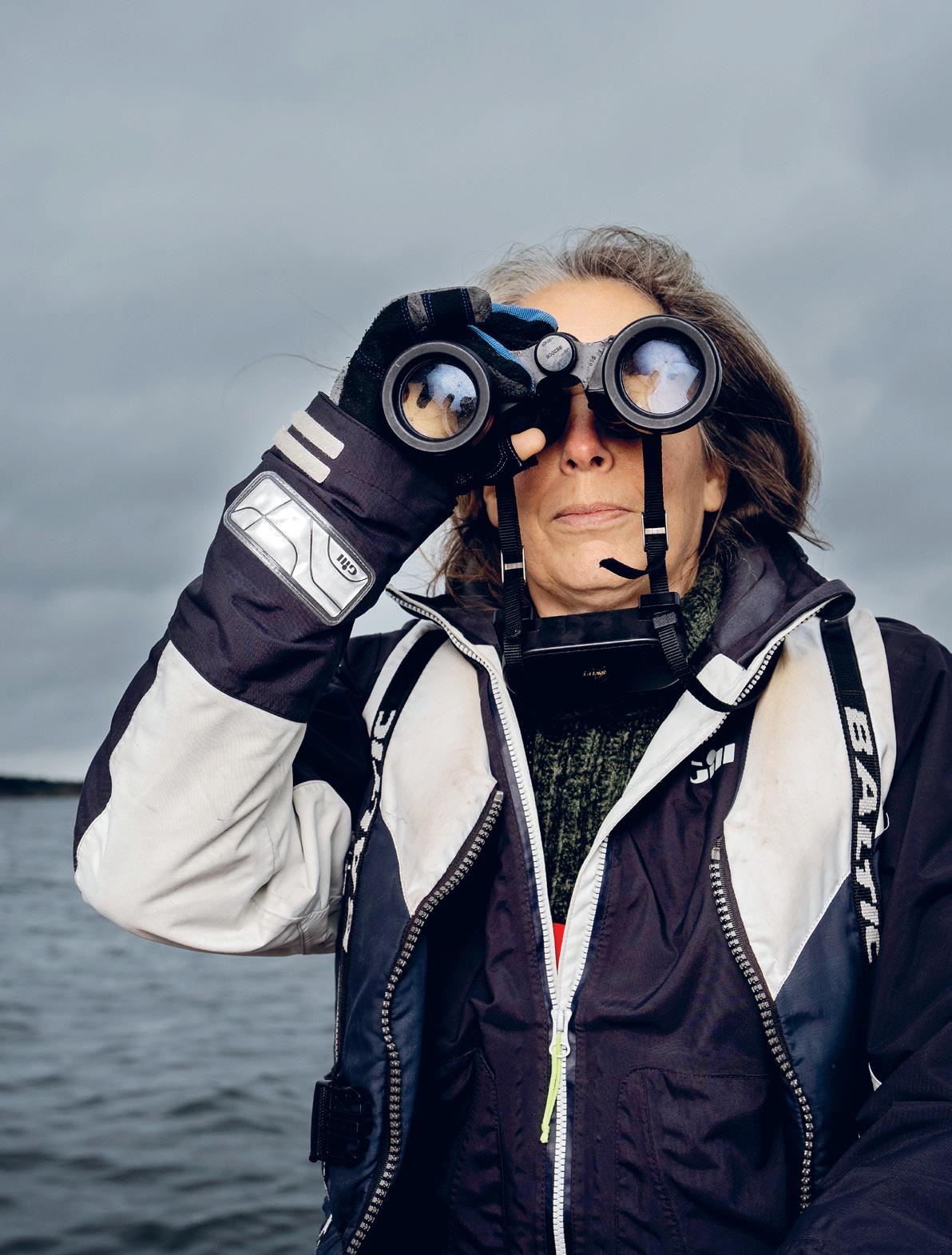
NEWS
INDEPENDENT STAFF MAGAZINE AT THE UNIVERSITY OF GOTHENBURG #4 OCTOBER 2023
News 04–15

04 Unique program on Human Rights.
05 China - a possible partner?

07 No women among honorary doctors.
08 Ukrainans on English course.
10 Collaboration with Ukraine and Georgia.
12 Drastic reduction of funding.
14 Protests from 4 000 people.
15 They are the University's friends.
Profile 16–19
16 Karin Hårding – with a focus on seals.
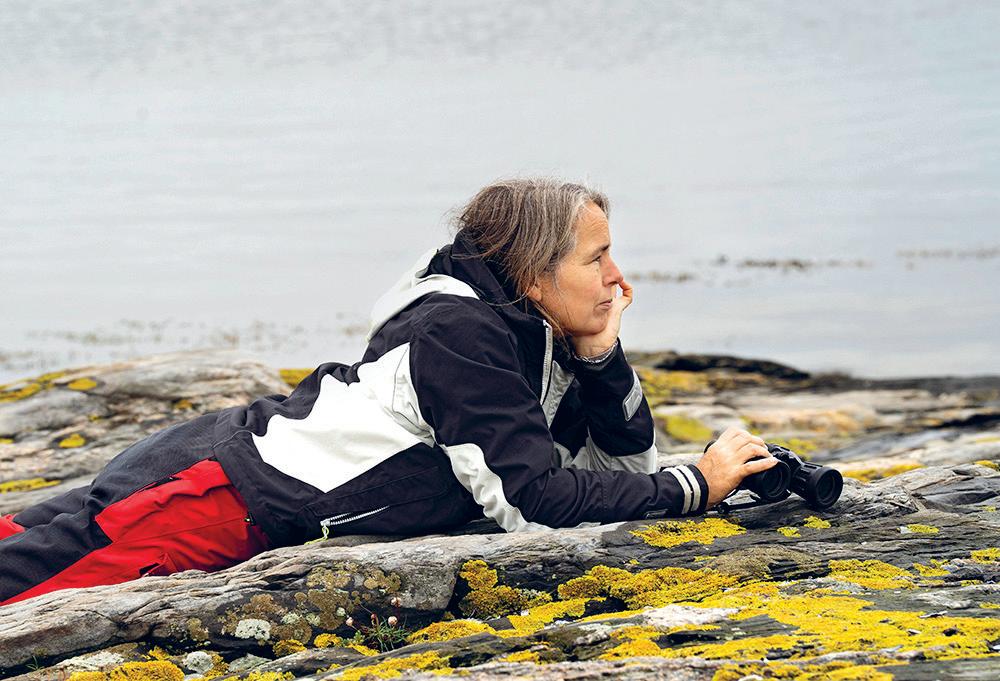
Report 20–24
20 Fishy findings.
23 AI as teacher assistant.

2 GUJOURNAL OCTOBER 2023 Contents 16
with the help of AI.
we trust China?
Profile Karin Hårding
Education
Can
23 5
Vice-Chancellor
»I am extremely proud and honoured«

his far into September, we have all probably begun to find our footing with courses, meetings and incoming e-mails. For my own part, I found myself wearing the formal robes during the ceremonial Installation of the Vice-Chancellor last week. At the traditionally dignified yet familiar ceremony in our beautiful auditorium, my predecessor handed me the Vice-Chancellor’s chain. Then we listened to beautiful music and inspiring speeches. Although the new management has been operating for some time now, the installation felt like a sort of green light. Let’s do this!
During my first month at work, I have met up with vice-chancellors from other Swedish universities in order to discuss our common issues. These have been things such as our relationship to politics and higher education autonomy, how the situation with the current European security situation affects both our activities and the European university alliances.
Back home, I have had a start-up with the new university management and discussed our priorities and working methods. In order to sort through all the questions and expectations that we ourselves and others direct towards the new management, we have agreed on three overall perspectives. We must focus on:
• Protecting the university's legitimacy as a social institution
• Developing attractive and appropriate environments for students and staff
• Ensuring transparent preparation and decision-making processes.
We will take these perspectives with us into the university’s upcoming strategy work. Together with many of you in the staff, it is time to come to grips with our overall goals and strategies for the period 2025–2027. It is my ambition and hope that the strategy work will be carried out at all levels and involve as many people as possible in our organization; after all, the work is about discussing where we are going and how we are going to get there!
I sincerely mean what I said during my installation speech: "I am extremely proud and honoured to be entrusted with leading the University throughout the next few years. I will do my very best to make sure that each stich in the knitwork we create during this time will form a beautiful and clear pattern that will inspire my future successor to continue renewing that which was handed down to us.”
Research for a better world
his issue's main news is the government's decision to stop all VR applications in development research. The Swedish Research Council (VR) defines the area as follows: "Research of particular relevance for poverty reduction and sustainable development in least developed countries, as well as support for collaboration and knowledge exchange between researchers in Sweden and researchers in least developed countries and lower middle income countries." The outrage is, of course, about the fact that development research is an important way to contribute to a better world, which also means help for self-help: The more trained teachers there are in the developing countries, the greater the opportunities for them to pass the knowledge on to new generations. But the anger also applies to the fact that the decision was made at such a late stage that the researchers had already spent time on writing their applications; it was also made without any discussion whatsoever with the scientific community.
Editor-in-Chief Allan Eriksson is currently on half-time leave, which means that I, Eva Lundgren, have taken over the responsibility for a time.
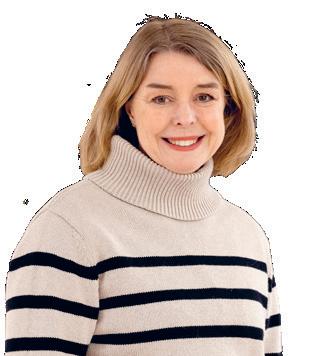
Editor-in-chief:
Allan Eriksson, temporarily on leave.
Editor:
Eva Lundgren
Phone: 031–786 10 81, e-mail: eva.lundgren@gu.se
Photographer:
Johan Wingborg, Phone: 070–595 38 01, e-mail:
johan.wingborg@gu.se
Layout: Anders Eurén, Phone: 031–786 43 81, e-mail: anders.euren@gu.se
Address: GU Journal,
University of Gothenburg, Box 100, 405 30 Gothenburg , Sweden.
E-mail:
gu-journalen@gu.se
Internet: gu-journalen.gu.se
ISSN: 1402-9626
Eva Lundgren
GUJOURNAL OCTOBER 2023 3
Masthead
Vice-Chancellor MALIN BROBERG
GUJOURNAL The GU Journal has a free and independent position, is made according to journalistic principles.
Unique program on human rights

“All human beings are born free and equal in dignity and rights.” This is the opening paragraph of the UN declaration on Human Rights. The rights apply to individuals. But human-rights arguments are also put forward by states in order to justify various decisions and actions.
How the geopolitical situation can affect these decisions is one of many questions being studied in a large and unique international research project with participants from ten countries.
HUMAN RIGHTS include the individual’s right to freedom, safety, education and equal treatment. But the declaration says nothing about how these human rights should be used, or which rights are more important than others, explains project coordinator Maria Grahn-Farley, Visiting Professor at the Department of Law.
– Thus, individual states hold the right of interpretation. For example, the Chinese state may claim that they respect human rights – in their own way.
One example of how complex it may get is the Covid-19 pandemic. The right
to freedom of movement and meeting with other people was strictly limited in many countries in order to protect the right to health and safety.
– Having states referring to human rights when they make decisions does not have to be wrong. But in a world that is trending more authoritarian, there is a greater risk that human rights are used to justify abuse and oppression: Russia, for example, allege that the invasion of Ukraine is about protecting the rights of the Russian-speaking minority that are under threat.
WHEN STATES, rather than individuals, use human rights as an argument for their actions, cracks appear in the protection of individuals. It is these cracks that the research projects will try to discover and rectify, Maria Grahn-Farley explains.
– The European Union finances the entire project with as much as 3 million Euro, which makes it by far the largest project ever granted to a legal institution in Sweden. Around forty researchers participate from a wide area of disciplines, such as law, anthropology, sociology and political theory. The researchers come from ten countries, of which five will be objects of study: Finland, India, Sweden, Taiwan and Ukraine. These countries were
selected because we are interested in how their location next to a state with ambitions of empire will affect their view of human rights. We plan to study three particularly complex examples where different human rights are weighed against each other: the Covid-19 pandemic –which has passed, migration – which is currently ongoing, and climate change – which is something that will mainly impact us in the future. We plan to cooperate with civil society and various organisations, and above all focus on equality and intersectionality, since certain groups more than others risk having their rights disregarded.
DIFFERENT RESEARCH teams will focus on different issues. For example, researchers from Sweden and Finland will compare the handling of the Covid-19 pandemic in the two countries, as well as studying differences between urban and rural areas. A research team in Taiwan will examine how the country’s Covid-19 strategy was affected by the conflict with China, and a group in Stockholm will work with human-rights organisations, Ukrainian researchers and Indian lawyers to examine how migration is managed, Maria Grahn-Farley tells us.
– The primary focus of the project is to examine how a
better understanding of how human rights are used to justify states’ decisions can counteract the authoritarian forces that are eclipsing the world, including in Europe and Sweden. Above all, we hope to be able to provide advice for the European Union on global goals and strategies for strengthening democracy and human rights.
Being the coordinator for a massive international project within a relevant and important field is a true privilege, says Maria Grahn-Farley.
– The project was originally intended for Leeds Law School in England, where I
4 GUJOURNAL OCTOBER 2023 News
Maria Grahn-Farley coordinates a program on human rights with about 40 researchers.
was a professor. Because of Brexit I brought it to Sweden instead. And it is truly courageous by the Department of Law at the University of Gothenburg to accept such an enormous undertaking. But it is not all that strange; there is already a strong focus on human rights here, and the Department of Law at the University of Gothenburg is, in my view, definitely the foremost one in Sweden on critical theory.
→ About the project: The full name of the project is HRJust: States’ Practices of Human Rights Justifications: A study in civil society engagement and human rights through the lens of gender and intersectionality and is funded by Horizon Europe by 3 million Euro (around 33 million krona). The project will run from 2023–2026 and entails collaboration between around 40 researchers at 15 departments in 10 countries: Finland, India, Israel, Italy, the Netherlands, Switzerland, Sweden, Taiwan, the Czech Republic and Ukraine. HRJust will for example identify geopolitical factors that impact states’
use of human rights. This will be done in five countries: Finland, India, Sweden, Taiwan and Ukraine, using three approaches: dialogue about human rights, inclusive democratic participation, and protection of human-rights defenders.
The project is coordinated by Maria Grahn-Farley, Visiting Professor at the Department of Law at the School of Business, Economics and Law. The principal theme for the project is EU as a global stakeholder for human rights in the handling of the Covid-19 pandemic, migration and climate change.
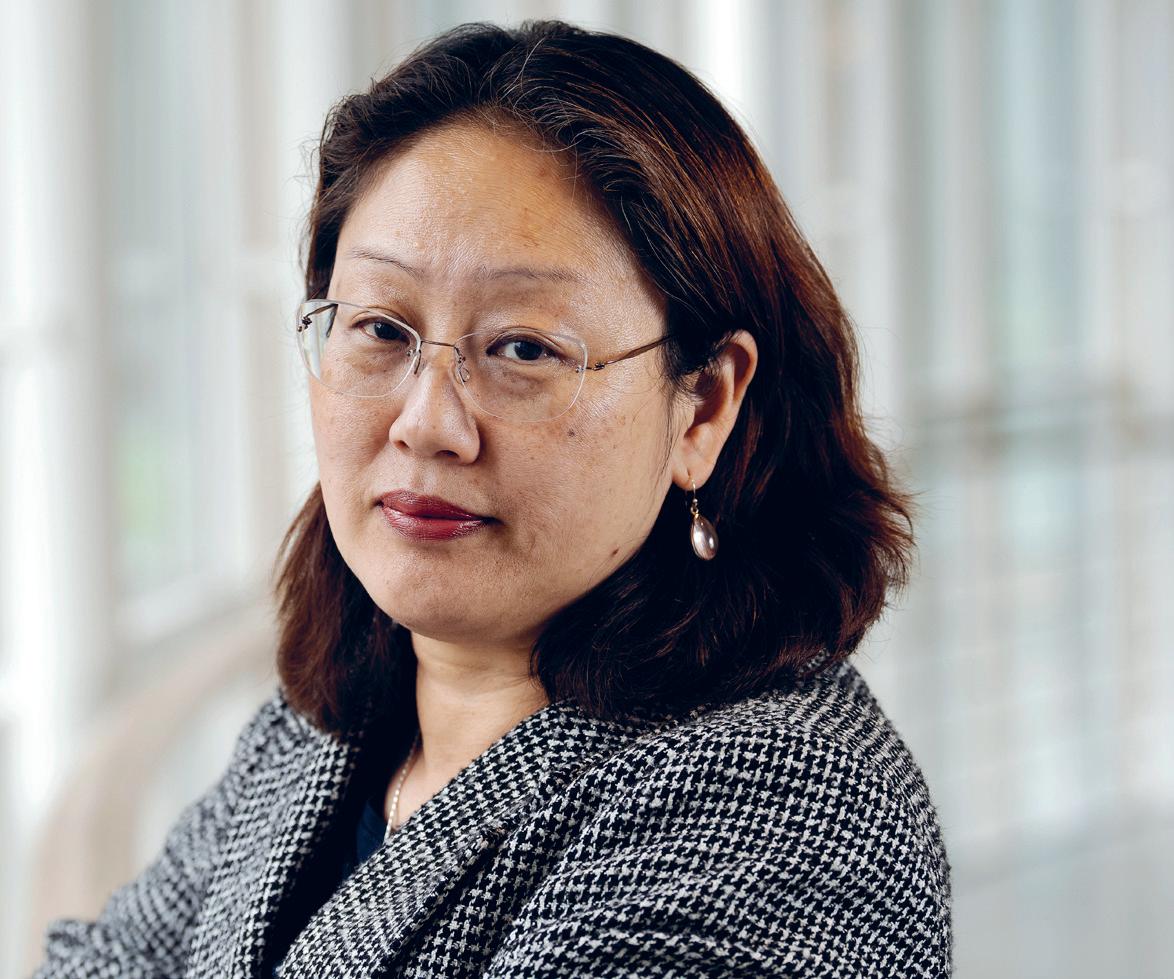
GUJOURNAL OCTOBER 2023 5
»Thus, individual states hold the right of interpretation. For example, the Chinese state may claim that they respect human rights – in their own way.«
Maria Grahn-Farley
Text: Eva Lundgren
Photo: Johan Wingborg
Balancing act to cooperate with China
Cooperation is the key to solving the challenges of the future. This was emphasised by Deputy Vice-Chancellor Max Petzold held the welcome address at the University of Gothenburg’s second invitational to a Vasapark Seminar, on Tuesday, 5 September. The subject matter was Responsible Internationalisation with a Focus on China. But how do we cooperate with a dictatorship?
THE THREE PANELISTS and researchers, Björn Gustafsson, Fredrik Fällman and Deliang Chen, opened with a brief introduction of themselves and their extensive experience of various research partnerships with China. The moderator of the event, Miriam Tardell from the Swedish National China Centre, a part of the Swedish Institute of International Affairs, then spoke briefly about the efforts to increase awareness about opportunities as well as challenges with partnerships between Sweden and China.
– We will continue to look at how Swedish universities act and what strategies they
have. Not only to ring the alarm bells but also to encourage partnerships, said Miriam Tardell and pointed out that China is Sweden’s fourth largest research partner.
SHE THEN CEDED the floor to Björn Gustafsson, Professor Emeritus of Social Work, who for three decades has been analysing statistics on income and poverty in China. He opened by observing that a Chinese middle class had evolved over this period, but that there are still enormous differences between cities and rural areas. In addition, China has moved towards greater gender inequality, in terms of the number of employed women in relation to men in the cities, while at the same time the gender wage gap has grown over these past 30 years.
FREDRIK FÄLLMAN, Associate Professor of Sinology, conducts research into Chinese history, religion and propaganda. He began by bringing up recent news that Cambridge University had chosen to halt a research project with China on missiles. He stressed the importance of partnerships, but that it is
of utmost importance to also stay informed and be aware of how things operate in China. As an example, he mentioned that Geely, which owns Volvo, has gone from being a family-owned business to a company controlled by the Chinese Communist Party.
– WE NEED TO cooperate, but we must also question things and be aware of certain things. Of course we should partner with top universities – but to what extent and at what cost?
Even if it changes nothing, we have to be open with our western values concerning things like research ethics and academic freedom, Fredrik Fällman argued.

The third speaker of the evening was Deliang Chen, Professor of Physical Meteorology, and internationally renowned for his extensive
climate research and his many years of work with the IPCC, the UN scientific climate panel.
He also opened with the news that the U.S. Has chosen to extend, and not terminate, an agreement on research partnership with China. He argued that the U.S. Benefits as much as China does – and all of humanity for that matter – from partnerships around issues such as reducing infant mortality and combating climate change. The Chinese researchers have the same answers to what the greatest threats are to humanity, he pointed out.
BUT HE DID think that Sweden should draft some form of policy on partnerships with China, and agreed with the importance of standing by and talk about our values, practices and research ethics.
All panel members were in complete agreement that cooperation with China is truly needed, but stressed that it requires awareness of the challenges and that we must never compromise with our values in terms of human rights, research ethics and academic freedom.
6 GUJOURNAL OCTOBER 2023
»Of course we should partner with top universities - but to what extent and at what cost?«
Fredrik Fällman
Text & photo: Johanna Hillgren
News
Deliang Chen, Fredrik Fällman and Björn Gustafsson in discussion with Mirjam Tardell.
No female honorary doctors this year
Is there a shortage of female visiting professors, partners and other laudable people connected to the university?
It would appear so. Among the nine new honorary doctors at the University of Gothenburg, not one of them is a woman.
The last time the university lacked female honorary doctors was 1994.
OVER THE PAST five years, the School of Business, Economics and Law has seen six male honorary doctors and one single woman, Canadian economist Ann Langley.
– It is of course every unfortunate, says Dean Per Cramér. Some of our subjects are male bastions, but the share of women is steadily increasing in economics and law. The departments nominate honorary doctors, so this is something that management needs to bring up with our heads of department.
Since 2009, the School of Business, Economics and Law runs an international visiting-professor programme, in order to build closer relationships with a number of renowned universities and schools of economics around the world. Around half of those professors in recent years have been women, says Per Cramér.
– So there is no shortage of prominent female colleagues, on the contrary. I am opposed to quota allocations, but we have to increase awareness of the importance of nominating women to honorary doctorates as well.
Over the past five years, Sahlgrenska Academy has seen six male and two female honorary doctors: Gunilla Backman and Carolina Klüft.
– SINCE THE departments’ nominations often have a male bias, more men are also being appointed, explains pro-dean Henrik Hagberg. We have discussed this matter on the university board and we do find it to be concerning, but inadequate equality often takes time to rectify. At Sahlgrenska Academy, we currently have more women than men on all levels except when
it comes to professors, and the same is true for for the universities we are partnered with. We do not want allocation by quota, but the directives for nominating honorary doctors can be clarified so the departments consider both men and women.
The Faculty of Education has, over the past five years, had five male and one single female honorary doctor: Kirsti Klette from Oslo University. But if you view it over a tenyear period it looks better: eight men and six women.
– THE FACULTY BOARD has worked on clarifying the criteria, even if we have not explicitly stressed the importance of gender equality. But we definitely want to see more women nominated, explains pro-dean Gun-Britt Wärvik.

But she points out that there have been few women nominated over the past few years, which may be a reason for poor gender equality.
– But there is hardly a shortage of women within the subjects studied at the Faculty
of Education. So we should definitely be much better at nominating female honorary doctors.
This year’s honorary doctors:
School of Business, Economics and Law: Martin Dufwenberg
Faculty of Arts: Anders Larsson
IT Faculty: Terry Regier
Faculty of Social Sciences: Fredrik Furtenbach and Paul Ronge
Sahlgrenska Academy: Guglielmo Giuseppe Campus
School of Business, Economics and Law: Martin Dufwenberg
IT Faculty: Terry Regier
Faculty of Science: Barry Costa-Pierce
Faculty of Education: Lenonidas Kyriakides and Roger Gustafsson
The Faculty of Fine, Applied and Performing Arts have not appointed an honorary doctor this year.
The years 2019–2023 32 per cent of the honorary doctors at GU were women. The years 2014–2018 41 per cent of the honorary doctors at GU were women.
GUJOURNAL OCTOBER 2023 7
»But there is hardly a shortage of women within the subjects studied at the Faculty of Education. So we should definitely be much better at nominating female honorary doctors.«
honorary doctors 2019 2020 2021 2022 2023 School of Business, Economics and Law 1 man 2 men 2 men 1 woman 1 man Faculty of Humanities 2 men 1 man 1 woman 1 man 2 women 1 man Artistic Faculty 1 man 1 woman 2 men 2 women IT Faculty 1 woman 1 man 1 woman 1 man Faculty of Science 1 man 1 man 1 woman 1 man 1 woman 1 man Sahlgrenska Academy 2 men 1 woman 1 man 1 woman 2 men 1 man Faculty of Social Sciences 1 woman 1 man 1 woman 2 men Faculty of Education 1 man 2 men 1 woman 2 men
Gun-Britt Wärvik
Text: Eva Lundgren
Photo: Johan Wingborg
Ukrainians on course in English
Last spring, a collaborative project started by the University of Gothenburg and various other stakeholders in Gothenburg, where Ukrainian refugees were given English classes.
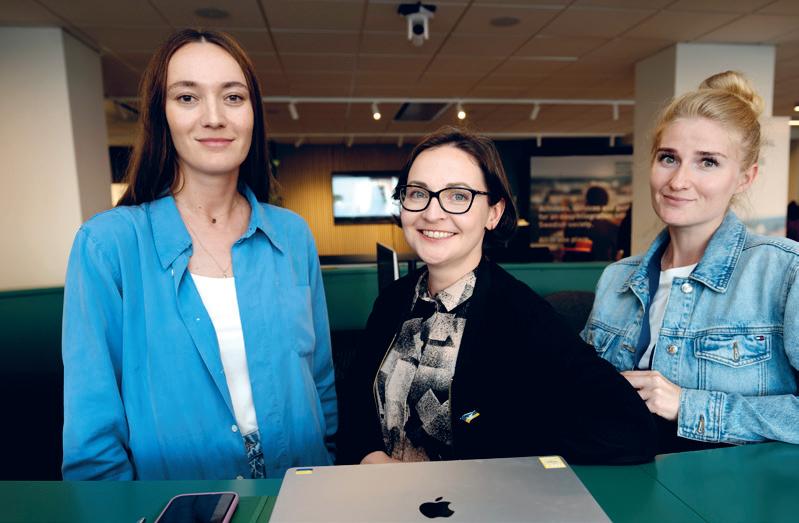

The project led to close to half of the attendees passing the test for level-six English, which is required for university studies. The partnership will now continue with conversational meetings.
AROUND THIRTY people have gathered at the International House at Järntorget and are now divided into groups around a number of tables. It concerns conversations in English and one of the moderators is Mary Jo Wick, Professor of Clinical Experimental Immunology at Sahlgrenska Academy. She opens by introducing herself.
– I came to Sweden from Minnesota in 1993 and it took me several years to become fluent in Swedish. So I have personal experience of the difficulties of learning a new language.
YEVHEN HAIYK SAYS that he has relatives in Sweden and has been here for eight months now, while Natalia Kozlova explains that she came to Gothenburg because her son started studying at Chalmers. Andrii Bezuhlyi finds the architecture in Gothenburg beautiful while Dmytro Mozhzhukhin would like to discuss the similarities between Strindberg and Isaak Babel.
A little over 60 people
have signed up for the conversational meetings, explains Mariya Melnyk, coordinator at the NGO, Help Ukraine Gothenburg who initiated the language classes.
– We divided the participants into two groups who
will meet on Tuesdays and Thursdays respectively, and also divided them according to their level of English. Just like last spring, the teaching is led by eight volunteers from the University of Gothenburg, both people with English as
their mother tongue, as well as international students and students who are studying to become English teachers. For teacher students this is not only a way of helping vulnerable people, but also an opportunity to meet other groups of
8 GUJOURNAL OCTOBER 2023
Olesia Mykhatlove, Mariya Melny and Milana Arslanova at Help Ukraine Gothenburg.
News
the training as the need arises.
Olesia Mykhailova at Help Ukraine Gothenburg arrived in Gothenburg as a refugee last spring. She is glad of the opportunity to help her countrymen. – I am at a safe place while there is a horrible war happening in my country. Of course, I will do what I can to help those who left their entire lives to get here. And education is important for fostering hope for the future and the ability to get on in life.
ABOUT THE PROGRAMME:
Mary Jo Wick talked about her own difficulties with the Swedish language.
only a way of helping vulnerable people, but also an opportunity to meet other groups of pupils than they are used to from Swedish classrooms.«
pupils than they are used to from Swedish classrooms.
One objective of the teaching that was held last spring as to provide support to young Ukrainians who wanted to sit the level-six English test, which makes you eligible for university studies. The project was successful, almost half of the participants passed the test, and at least 15 of them were admitted to programmes at various universities in Sweden. The conversational meetings that are being held now are not as focused on higher education, but they still help those who would like to sit the oral part of the English test. Catherine Gillo Nilsson, coordinator at the Section for Student and
is
Educational Support, has already informed the Examination Office in Gothenburg that around 30 of the participants would like to sit the test.
– WHAT WE ARE doing right now is a pilot project, but I hope that the University of Gothenburg will continue to support and develop
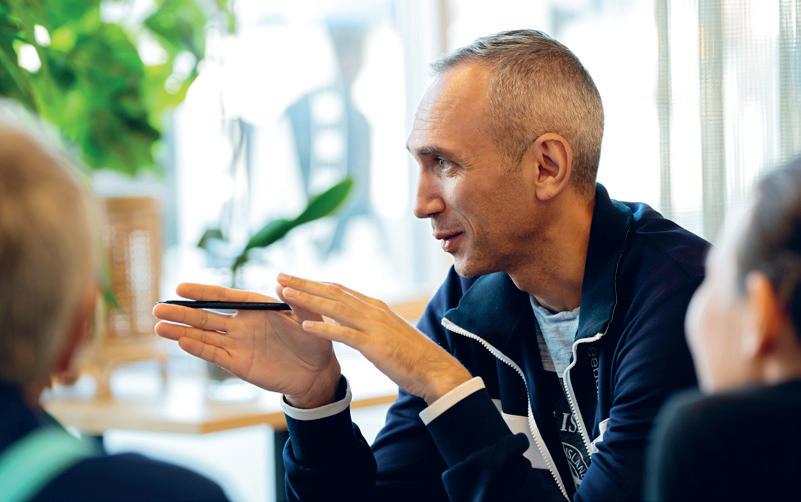
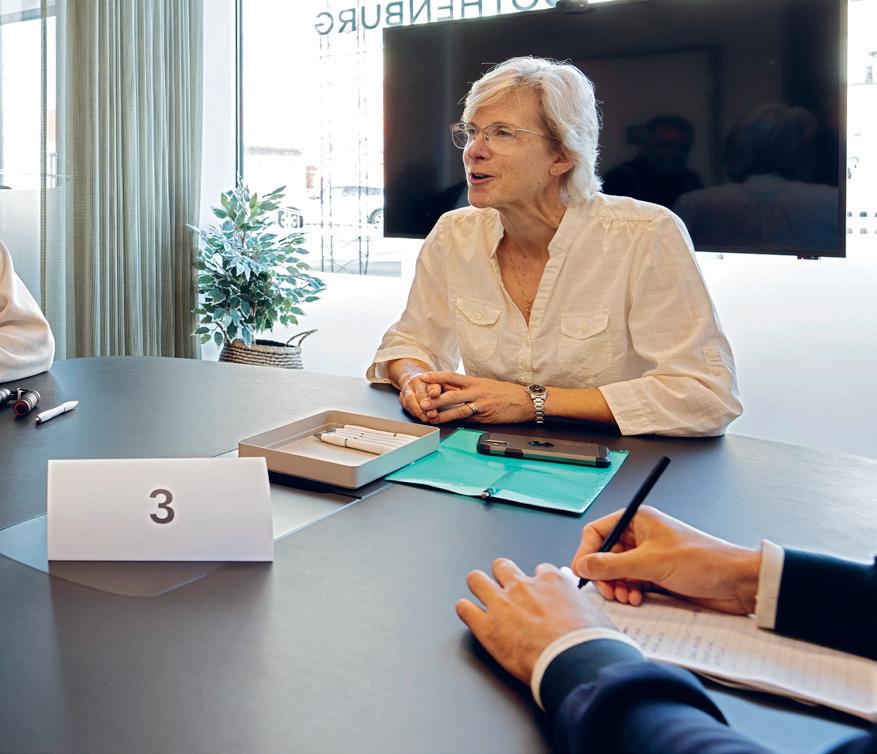
Teaching English to Ukrainian refugees is a pilot project in collaboration with Help Ukraine Gothenburg, Göteborgs Stadsmission, Support Group Network. Both English-speaking employees at the University of Gothenburg and English teachers in training as well as international students participate in the project as volunteers.
Text: Eva Lundgren
Photo: Johan Wingborg
»For teacher students this
not
GUJOURNAL OCTOBER 2023 9
Mariya Melnyk
Collaboration a key to good health
Modern master’s programmes and doctoral degrees in public health, that is the goal of the partnership between the University of Gothenburg and universities in Georgia and Ukraine since 2017.
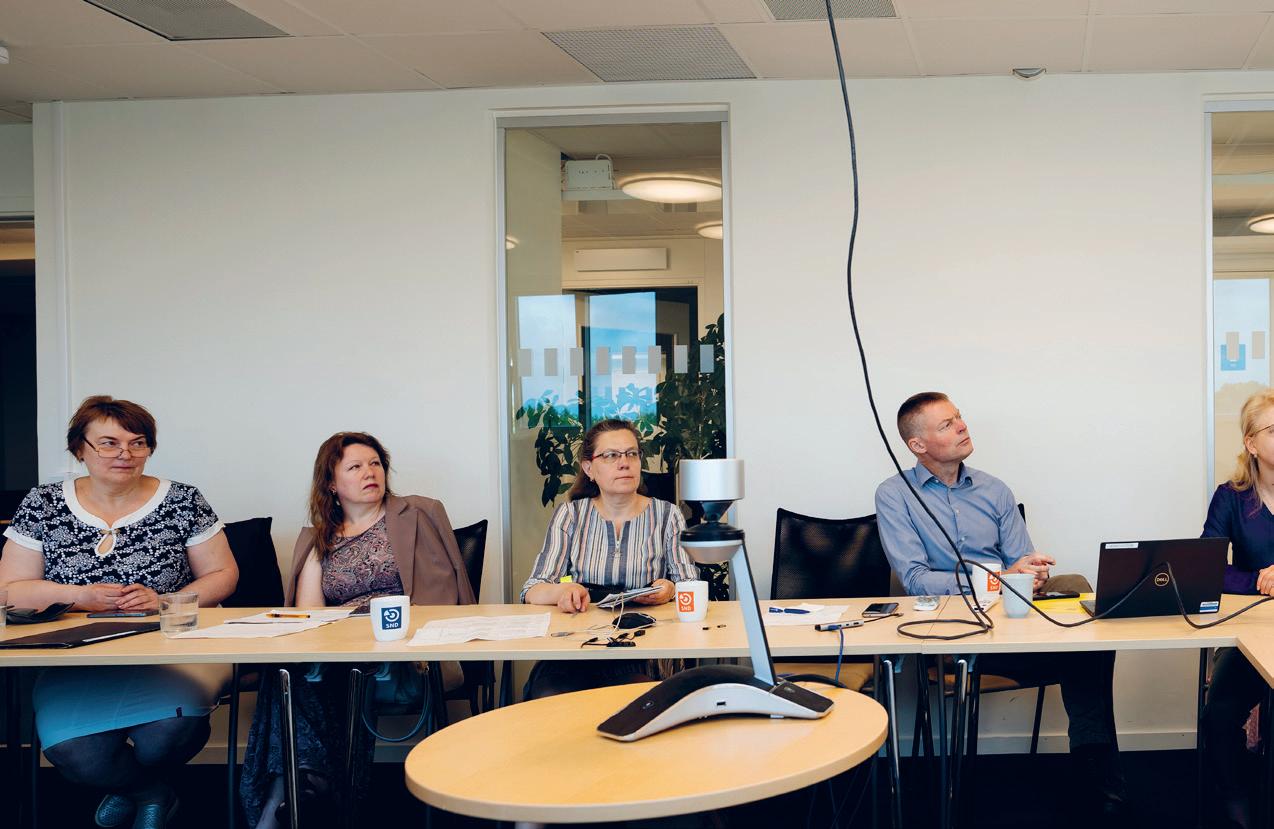
For two weeks in June, representatives of universities in both countries came to Gothenburg to learn more about our work on public health.
– PUBLIC HEALTH is a complex field that is not only concerned with healthcare, but also with society as a whole. During our stay in Gothenburg we visited the Sahlgrenska University Hospital and the Opaltorget Family Centre, and I am very impressed with how different stakeholders work together to promote good public health.
There are the words of Tetiana Hruzeva, prefect at the department for social medicine and public health at Bogomolets National Medical University (NMU) in Kyiv. Togheter with five Ukrainian colleagues and five colleagues from the Ivane Javakhishvili Tbilisi State University (TSU) she attended a training programme from 12–23 June. This involved

visits to various departments at Sahlgrenska Academy, lectures and discussions. They also attended a PhD thesis defence .
MAX PETZOLD, Professor of Biostatistics initiated two of the three Erasmus programmes that have been financed so far. The first one concluded in 2022, the second one in connection with the June visit and the third, which has been expanded to also include Armenia and Moldova, has just started, he explains.
– The countries we collaborate with have extensive experience of tuberculosis and other infectious diseases, which we can learn from in Sweden. In re-
10 GUJOURNAL OCTOBER 2023
News
Tetlana Hruzeva
turn they gain knowledge of the holistic approach that we have, where mental health and social factors are also included in the research into public health. The objective of the training is handson experience for all parties with regard to creating better and more modern master’s and doctoral programmes within public health. But it is also about lifelong learning, giving healthcare providers more opportunities for further training.
ONE RESULT OF the exchange is that NMU has started a master’s programme in public health, and is also planning a doctoral degree, says Tetiana Hruzevas.


– To some extent, Ukraine has the same health problems as Sweden, such as diabetes, cancer and cardiovascular disease, but also other challenges. 10–15 years ago, as much as 60 percent of the population smoked, today we are down to 39 percent. One reason is the ban to sell tobacco products to people under the age
Interested in social questions from an international perspective?
IN THAT CASE check out the Tuesday seminars that the Department of Social Work arranges since the beginning of September.
→About the programme: The EU funded Erasmus+ International Credit Mobility programme is an investment in collaboration with countries outside the EU/EEA. Max Petzold participate in three such programmes, the first two in collaboration with Ukraine and Georgia, while the third one involves Moldova and Armenia. The aim is to strengthen undergraduate and doctoral programmes within public health. The projects are available at the School of Public Health and Community Medicine (SPHCM), Department of Medicine.
of 18, another is an information campaign in schools that is often organised by young students, who may find it easier to speak to the pupils. Another major health issue is the high alcohol consumption.
Nino Chikhladze, Professor of Medicine at the TSU, told us that his university’s Faculty of Medicine since 2021 has an international advisory board, of which Max Petzold is a part. The aim is to improve the quality of research and training throughout Georgia.
– THE ERASMUS partnership has led to an update to the doctoral degree in public health and epidemiology as well as starting new courses and doctoral programmes in public health, both at the TSU and the Ilia State University in Tbilisi. This type of partnership means an amazing opportunity for the participating universities to share knowledge, experience and best practice relating to public health. But as good health is important to all people, regardless of where they live, I hope that this partnership will act as an example of better education and practice, not only in our countries, but across the globe!
Text: Eva Lundgren

Photo: Johan Wingborg
– In October, the seminars will, among other things, deal with Pakistani women's experiences of caring for disabled children in Scotland: an intersectional examination of motherhood, family life, disability and state support (October 3). Another seminar is about the quality of parent-child and parent-young adult adjustment during covid-19, a study in 5 countries (October 10). We also have a survey of Polish migrant parents' experiences of child-rearing and help-seeking in a culturally diverse neighborhood on Ireland (October 17), explains postdoctoral fellow Hanna Mac Innes, who is the initiator of the series
The seminars are on Zoom and consist of a 15-minute lecture followed by a 15-minute discussion. Lecturers from all over the world take part. The idea is that this will enable more people to participate.
– Primarily, we address academics and trainees, but all interested parties are welcome. The seminars are free and no advance registration is required. It should be easy to take part in research!
Time and place: Every Tuesday at 4 p.m. to 4.30 p.m. on Zoom: https://gu-se.zoom. us/j/67876852901
Contact: Hanna Mac Innes: hanna.macinnes@socwork.gu.se
For two weeks, university representatives from Ukraine and Georgia visited GU to learn more about public health work.
GUJOURNAL OCTOBER 2023 11
Hanna Mac Innes
»For teacher students this is not only a way of helping vulnerable people, but also an opportunity to meet other groups of pupils than they are used to from Swedish classrooms.«
Nino Chikhladze
Drastic consequences of reduced funding
June 22, the government made the decision to suspend all applications to the Swedish Research Council within development studies. It has engendered vocal protests, not only in Sweden but also internationally.
– The decision risks undermining Sweden’s goodwill as a donor nation. It also goes against other governmental goals, such as limiting migration, which is fuelled by things like war and poverty, precisely what development studies are about, says Gunilla Krantz, Professor of Public Health.

ONE OF GUNILLA KRANTZ’S projects, which involves collaboration with five other universities, looks at malnutrition in mothers and children in Rwanda.
– The project employs eight doctoral students, two of whom at the University of Gothenburg. All the funding we have will be spent on making sure that they achieve completion. Anything, such as our researchers travelling to Rwanda, we will not be able to afford Of course, we can meet over Zoom, but it will hamper our collaboration if we cannot meet in person.
The decision last summer was preceded by another decision just before Christmas, when half of the Sida budget for development studies was cut.
– All in all, this is a massive blow to research into global health and ever since, there is a riotous atmosphere among many
colleagues, says Gunilla Krantz. Another university partnership with Rwanda, which started 20 years ago, concerns the environment. Johan Uddling, Professor of Botanic Ecophysiology, researches how tropical trees are impacted by climate change, and which species are suitable for planting in different parts of the country, a project that has funding until the end of 2025.
– THERE ARE OF course other financiers, such as Formas or the Swedish Research Council’s main call for applications, but they do not assess how important the research is from a developmental perspective. The committee allocating the funds must be able to assess what benefit the project will have for development and poverty reduction, the particular challenges that exist within developmental partnerships, and how credible the application is. To make such assessments requires particular expertise that a regular committee cannot be said to possess.
Many successful people in Rwanda, such as several ministers of government, received their doctoral degree at the University of Gothenburg, Johan Uddling points out.
– There is a great commitment to research and development in developing countries that Sweden has done an excellent job of promoting, which we now risk undermining.
Deputy Vice-Chancellor Max Petzold, for example, is involved in a project on healthcare for
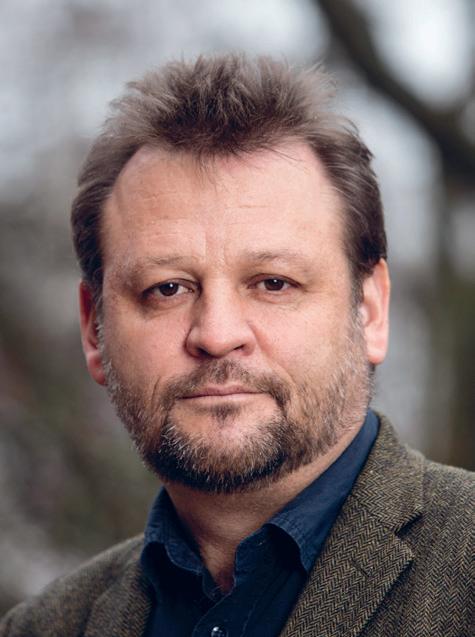
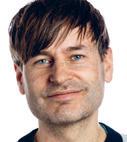
nomadic people in Somalia. He points to the fact that the government’s hasty decision, which was made with no public discourse or consultation with the universities, makes the planning of extended research partnerships impossible.
– YOU LOSE THE entire longterm perspective. For example, the Swedish Research Council’s network grants, which focuses on long-term partnerships between Sweden and various developing countries, will be pointless if all funding suddenly dries up. Regular Research Council applications do not for example fund the type of medical research that is
12 GUJOURNAL OCTOBER 2023 News
Gunnar Köhlin, head of EfD
»If Sweden experiences difficulties in the future it may be a good idea to maintain good relations with others.«
Robin Biddulph
required in developing countries. And applying for funding abroad is difficult, not least because it often requires extensive co-financing from the university.
IN COLLABORATION with researchers from Tanzania, Mozambique and Södertörn University, Robin Biddulph, Associate Professor of Cultural Geography, submitted a Research Council application last spring.
– We spent a lot of time on writing the application. Then, in the midst of the process when an international panel were to conduct their review of it, everything was suddenly scrapped Research and aid have been excellent tools for Sweden in creating good relations around the world, he argues.
– Before you wind up what you have built over decades you need to have a well-thought-out plan for how to still maintain international partnerships. It is easy to destroy relationships, but they take a long time to create. There is also a long-term aspect: the poor countries of today may well be the wealthy countries of tomorrow. If Sweden experiences difficulties in the future it may be a good idea to maintain good relations with others.
GUNNAR KÖHLIN, Associate Professor of Environmental Economics, is the head of Environment for Development (EfD) with thirteen centres across the world. Since EfD receives Sida grants from other items than just development studies and is not funded by the Research Council to any great extent, their operations will not be significantly impacted.

– But the halving of the Sida budget for development studies last year was a shock to those of us who do research in developing countries. The most recent decision is yet more confirmation that this is a field that the government does not find important. Not least young researchers, about to embark on a career, risk losing their faith in the future when the terms are so uncertain.
Gunnar Köhlin argues that partnerships with developing countries must be allowed to take time in order to develop into something good.
– They often involve a winwin situation where Swedish researchers include researchers from the Global South in their networks, which of course contributes to the internationalisation of our universities. And as developing countries get more and more university-trained teachers, it improves the opportunities for their young citizens to get a university education, which means that they can develop domestic knowledge for handling and preventing crises and problems. Thus, Swedish research aids contributes to development and democratisation in the Global South. The fact that the government again hampers development studies must simply be because they are not particularly well informed about how important it is.
ABOUT THE DECISION: On December 22, 2022, the government made the decision to cut the Sida research grants by 54 percent, which corresponds to around half a billion krona. On June 22, 2023, the government decided that the Swedish Research Council shall no longer fund grants within development studies, amounting to around 180 million krona. The decision will take effect immediately, but projects already granted will not be affected.
Since 2015, the University of Gothenburg has received a little over 200 million krona from the Research Council for development studies. It normally concerns 7–8 grants per year. Around a third has gone to the School of Global Studies, but the Faculty of Social Sciences, Sahlgrenska Academy, the Faculty of Science and the School of Business, Economics and Law: have also received funding, as well as occasionally the Faculty of Arts. Most grants amount to 3–6 million krona, but in 2018 Nawi Ng at the Department of Medicine received 10 million for a project on the elder-
ly, poverty and health. Out of the 258 applications submitted to the Research Council this year within the four types of grants, project grants, starting grants, international post-doc and network grants, 23 applications were submitted by researchers at the University of Gothenburg.
The University of Gothenburg stand behind the letter sent to the government by the Association of Swedish Higher Education Institutions (SUHF) on July 4, where the universities calls for the government to reverse the decision.
Text: Eva Lundgren
→ Fakta: Den 22 december 2022 fattade regeringen beslut om att skära ner forskningsbiståndet till Sida från 960 miljoner kronor till 440 miljoner. Den 22 juni 2023 beslutade regeringen att Vetenskapsrådet inte längre ska finansiera bidrag inom utvecklingsforskning, en summa på cirka 180 miljoner kronor. Beslutet gäller med omedelbar verkan, men redan beviljade projekt påverkas inte.
GU har sedan 2015 fått in drygt 200 miljoner kronor från VR:s utvecklingsforskning. I de flesta fall rör det sig om 7–8 bidrag per år. Cirka en tredjedel har gått till institutionen för globala studier, men även övriga Samhällsvetenskapliga fakulteten, Sahlgrenska akademin, Naturvetenskapliga fakulteten och Handelshögskolan har fått medel, samt i några fall Humanistiska fakulteten. De flesta anslag är på 3–6 miljoner kronor men 2018 fick Nawi Ng vid institutionen för medicin 10 miljoner för ett projekt om äldre, fattigdom och hälsa.
Av de totalt 258 ansökningar som i år inkommit till VR inom de fyra bidragsformerna projektbidrag, etableringsbidrag, internationell postdoktor och nätverksbidrag var 23 inskickade av GU-forskare.
Göteborgs universitet står bakom den skrivelse Sveriges universitetsoch högskoleförbund (SUHF) skickade till regeringen den 4 juli där lärosätena uppmanar regeringen att ta tillbaka beslutet.
GUJOURNAL OCTOBER 2023 13
Photo: Johan Wingborg
»You lose the entire longterm perspective.«
Max Petzold
4,000 signatures on petitiontion
4,235 people from 91 countries, both researchers and others, have so far signed a petition protesting against the government’s decision. The initiator is Ellen Lust, Professor of political science at the University of Gothenburg and head of the Governance and Local Development Institute (GLD).
– FOR MORE THAN 50 years, Sweden has been a leading international operator in development research and aid, which has contributed to significant results in many countries, Ellen Lust point out. Considering the fact that the current major global problems, such as climate change, war and conflict, lack of respect for human rights and deteriorating welfare, are precisely the areas that development research study, stopping its financing can have enormous consequences. So the government’s decision does not only impact Swedish research, but also other researchers and citizens in other parts of the world. The global involvement has also contributed to the “goodwill” that Sweden built for many years across the globe and which now risks being eroded.
THE PETITION points out that Swedish research has been of crucial importance for things such as combating infectious disease and MDR bacteria and viruses. The research has also played a vital role in peace building in conflict zones as well as in the work to promote human rights, democracy, equality and good governance.
GLD will not be particular-
ly impacted by the government’s decision, says Ellen Lust.
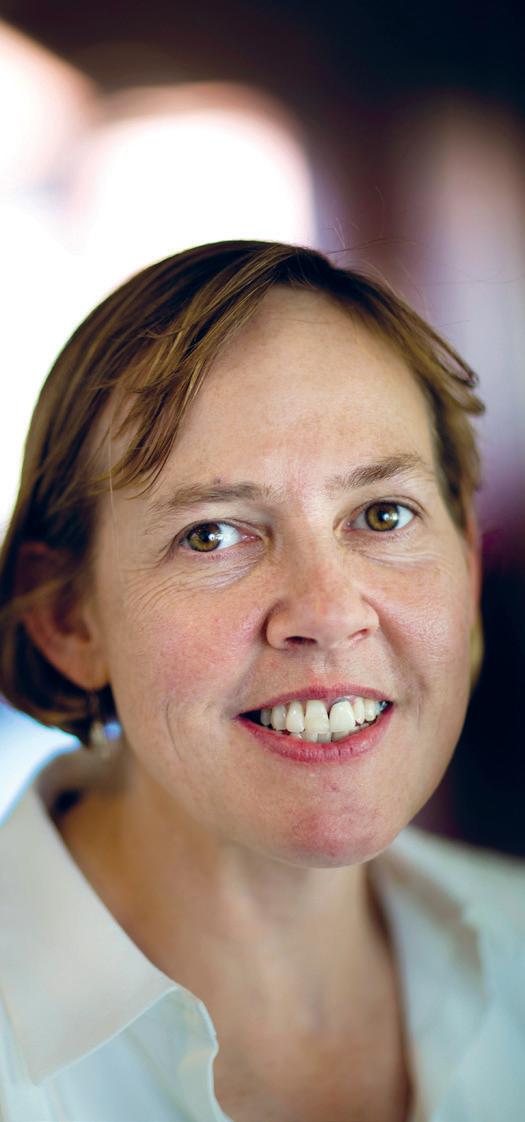
– But we have still received some support over the years, such as for a network programme for partnership between researchers in the global north and south. We have also received funding for research into local governance in Kenya, Malawi and Zambia. Stopping this funding will inhibit the possibility of similar projects in the future.
The petition includes three requests of the government: To bring back the funding that has been suspended, to investigate and secure support for reforming the support system for research with relevant stakeholders at the universities, research councils and international partners, as well as to strengthen research funders’ opportunities to promote partnerships with researchers in low-income countries.
14 GUJOURNAL OCTOBER 2023 News
Text: Eva Lundgren
Photo: Johan Wingborg
Ellen Lust has initiated a petion against the government's decision.
»For more than 50 years, Sweden has been a leading international operator in development research and aid ...«
Ellen Lust
Finding a University friend
How can you actively promote broad-based recruitment and inclusion into higher education?
One such effort is “Universitetsvän” (University Friend) where new arrivals are matched with students and doctoral students at the University of Gothenburg.
– It is about reciprocal learning that is also intended to be fun and stimulating, explains Catherine Gillo Nilsson at Educational Affairs.
THE METHOD IS BASED on tried and tested experience and research within the fields of peer support and peer helping. At joint meetings, the participants – mentors and mentees – have been given information on the paths to university studies, as well as new skills in intercultural communication, the art of asking questions, setting goals, defining their own values, problem solving and decision making. Thus, it concerns skills that are of importance in a variety of contexts, not only within the scope of the University Friend project.
– Another aim of “Universitetsvän” is to provide students who are new to Sweden with an interface with the university by using other students and university employees. Many mentees do not have any natural contact with higher education in Sweden, so this method for building relationships is important, says Catherine Gillo Nilsson.
SO WHAT DO THE participants think? Student Philip Magnusson says that he and some participants get together on their own time.
– We have visited my facul-
ty, had coffee and looked at the premises. I also showed them how some courses were organised on Canvas, how to find courses on the university website and how to apply to programmes at antagning. se. Another time we took a walk around town and talked about this and that. It has been a fairly loosely defined format for getting to know one another, talk about goals in life and exchange experiences.
HE ARGUES THAT he has learnt quite a lot himself through his participation in Universitetvän.
– For example, I have learnt about university studies in other countries, what it is like to come to Sweden for the first time and what the path to higher education may look like for them. We have also learnt from one another about other areas of life, such as applying for jobs and attending interviews. You also gain some practical knowledge about things like interview methodology and setting goals. It has really been a rewarding experience that I think everyone should
take the opportunity to try in the future.
Student Elisabeth Wagersten tells us that her mentees wanted above all to improve their language, mainly their spoken Swedish.
– So, a lot of it was mostly just talking! I also provided some tips on university studies and recommended apps for language and spelling and such things. I myself have also learnt much from my mentees about coming from another country, wanting to study in Sweden.
Emma Karlander is Educational Affairs coordinator. She argues that the joint meetings provide time for more in-depth conversations and a better understanding of the new students’ background, current situation and thoughts about the future.
– I HAVE ALSO gained a lot of lovely memories, everything from the first meeting between the mentors and mentees, which was characterised by both nerves and expectations, to the talks with the mentees after field trips when a new subject or
interest had been discovered. Being able to be a small part of their journey to the university is something that really pleased me!
Despite the challenges faced in the future and the different circumstances surrounding them, the new students are full of optimism and joy, Catherine Gillo Nilsson explains.
– The major changes in the conditions and situations the participants have faced, they turn into something positive by taking the opportunities for development. Meeting such inspiring individuals is a privilege, and a great motivator!
Text and photo: Malin Tengblad
→ Facts: About Universitetsvän: Universitetsvän is a mentor programme where new students are matched with students and doctoral students that was introduced in 2017.
The programme comprises three group meetings, field trips to faculties as well as individual meetings between mentor and mentee.

GUJOURNAL OCTOBER 2023 15
Elisabeth Wagersten with mentees Lara Khateb, Inna Olsson and Hiba Ismail.
Seals Ahoy
From the moorings on Nordön near Marstrand, Karin Hårding sails out towards the Älgöfjord and enjoys the skerries and the sea. On this particular rainy day in August, there are no seals to be seen. Instead, she discovers eiders, herons and late-summer flowering violets and Baldr's brow. She is a professor of ecological zoology and sailing is something she has always enjoyed.
Population dynamics is about investigating how wild species are affected by various environmental factors. There can be natural variations, for example when it comes to food availability, but also variation that is caused by humans, such as the release of environmental toxins. Karin Hårding's object of study is the harbor seal, which together with the gray seal and the ringed seal make up the three seal species found in Swedish waters.
– At the beginning of the 20th century, there were plenty of seals of all three kinds on our coasts. However, because of excessively hard hunting, seal bounties and environmental toxins, the seals became increasingly rare. In the 1970s, the biologist Tero Härkönen began an extensive study on Tjärnö which showed that the harbor seal was almost extinct. In addition, it was found that a large part of the Baltic Sea seals was sterile due to environmental toxins. In 1974 it was therefore forbidden to hunt seals and the population began to recover.
But then came the terrible spring of 1988, when dead harbor seals were found on Anholt; the Swedish west coast was later filled with rotting animals.

– The cause turned out to be a previously unknown morbillivirus that is related to CDV and measles. Thousands of harbor seals died during that summer and the seal death attracted media attention from all over the world. Quite soon, however, the disease receded and the seals began
to increase in number again. Unfortunately, the terrible virus returned in 2002, resulting in thousands of more dead animals.
In the winter of 2009–2010, Karin Hårding went on an Antarctic expedition with the icebreaker Oden. The expedition had several objectives, but one was to investigate infection dynamics in Antarctic seals.
– Among other things, we took blood, bacteria and virus samples from Ross, Weddell and Crabeater seals to find out how they cope with CDV, which was brought to the continent by sled dogs in the 1950s. It turned out that the seals had developed antibodies and that the mortality rate was therefore comparatively low.
Antarctica is the seals' paradise, explains Karin Hårding.
– There are several million seals there and because they have never been hunted, they are completely fearless and often approach people to say hello. Maybe they perceive us humans as some kind of strange penguins?
Female harbor seals become sexually mature at about four years of age, males a few years later. Most females do not live more than ten years in the wild, says Karin Hårding.
– So I was both surprised and happy when my research group and I were out at Koster some time ago doing an inventory. On one of our high-resolution photos, we saw a seal with a mark on its
Profile 16 GUJOURNALEN OCTOBER 2023
Text: Eva Lundgren Photo: Johan Wingborg
shoulder. When I looked deeper, I saw the number 15. We started flipping through old binders of data from our early cryo-labeling studies. The seal turned out to be one that I myself had marked back in 1992 – and which was now a full 33 years old!
When the seals were dying out in the middle of the 20th century, it was due to excessive hunting and environmental toxins. Today, the threats look different.
– In northern Skagerak there is heavy overfishing with trawlers, which has led to diminishing populations of both cod and herring. But harbor seals are opportunists; they eat whatever fish is available, which nowadays often means poor cod, Norway pout and sand eels, which we humans discard. However, these species are less energetic than cod and herring, and often also smaller, so the harbor seals have to spend more and more time finding food. It affects both growth and reproduction; the seals we find today are smaller than a few years ago and worryingly few pups are born.
It takes a long time for a stressed seal population to recover. A female only has one pup a year, and sometimes not even that, explains Karin Hårding.
– Seals have so-called delayed implantation; the animals can mate for a certain period but save the fertilized egg for another period. In this way, seals are naturally adapted to skip a pregnancy when fish are scarce. Of course, it is still concerning if
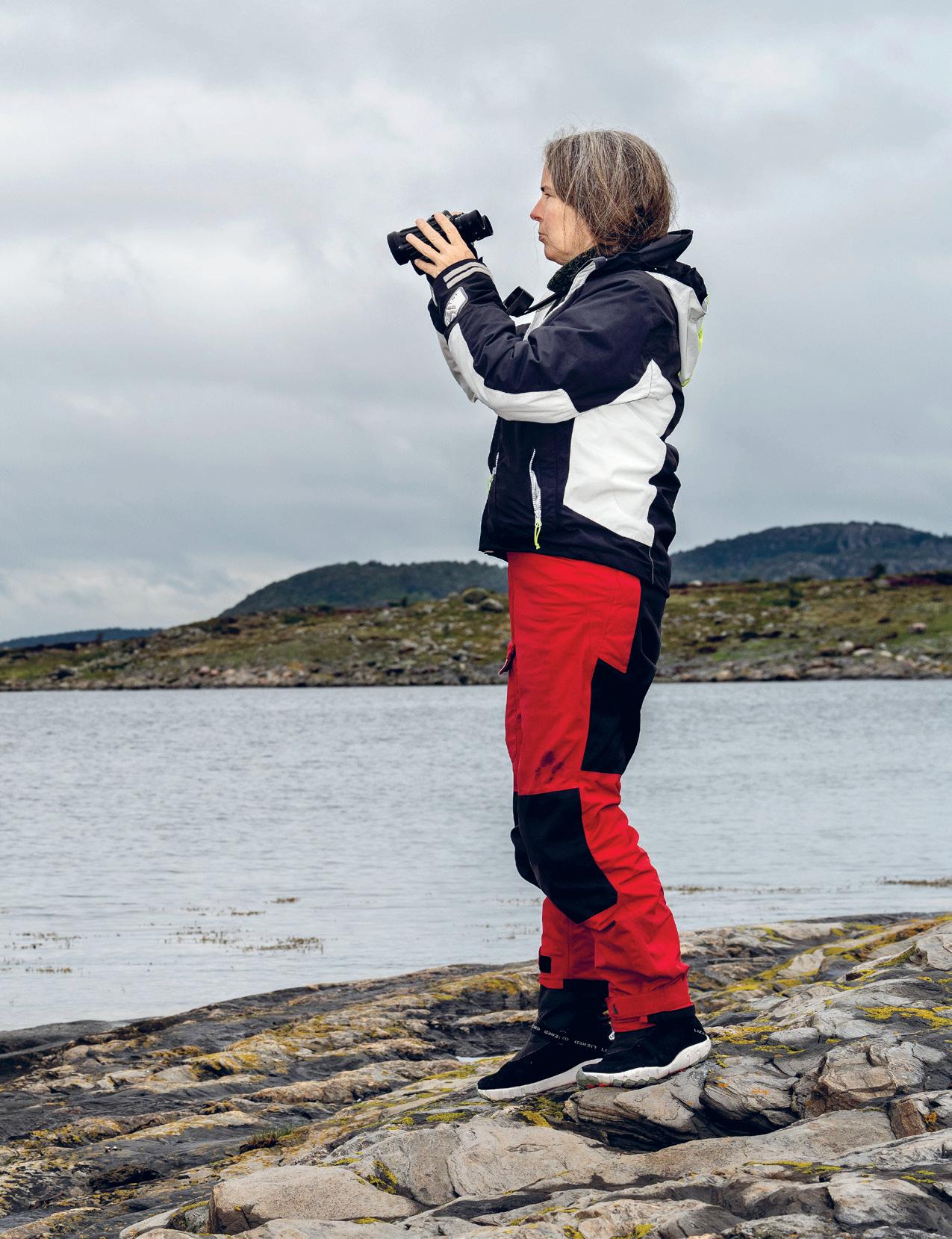
GUJOURNALEN OCTOBER 2023 17
there is a shortage of fish several years in a row. Before the findings of declining growth came to light, the Swedish Environmental Protection Agency had, after almost 50 years, given permission for license hunting of the three Scandinavian seal species; the reason was that they had been increasing for a longer period of time.
Another reason was that many fishermen consider seals to be competitors for valuable fish. In a statement from the University of Gothenburg, among others, Karin Hårding criticizes hunting.
– The harbor seals are at risk of starvation, not because there are too many of them, but because there is too little food. It is also far from clear that hunting seals would help the overfished stocks to recover. By eating fish of 7–20 centimeters, the harbor seal reduces competition among small fish, which fisheries biologists have found favors rather than harms the regrowth of larger fish; the seal's role in the ecosystem complements the function that the large fish, which are now scarcely present, used to have in maintaining healthy fish stocks. The way to get healthy stocks back is instead to drastically reduce trawling so that there will be big fish in the oceans again!
Harbor seals stay mostly around their dens. But on occasional excursions they can swim long distances in search of food, from Koster far down in the Kattegatt and up again.
– But when it is time to have their pups, they return to their birthplace. This means that the animals found on Koster, Hallands Väderö or Anholt belong to different genetic populations; if you shoot too many animals in one place, you can wipe out an entire colony.
Since the 1970s, the Swedish Museum of Natural History has been conducting annual seal counts using small aircrafts, which has provided long time-series of total population sizes. In addition, the seal researchers do more detailed field studies of the number of pups and their survival rates. In the past, researching was about climbing and sneaking on skerries and holms and observing with binoculars. Today, surveillance takes place much more efficiently with the help of drones, according to a method developed by Karin Hårding and her colleague Eduardo Infantes.
– We can both count and weigh the animals automatically from systematically taken photographs that overlap each other in a mosaic.
Now Daire Carroll, a young researcher in the project, is developing the method further.
– Instead of cryo-labeling the animals, as we did before, we can identify them by taking pictures. The dot pattern on the fur is unique to each animal, much like fingerprints. This method will provide a unique insight into the seals' migrations, lifespan and how often they give birth. With today's technology, counting has become both easier and more accurate, and we also don't have to go ashore and risk disturbing the animals. In particular when it comes to harbor seals and their diet, there is also data from Tero Härkönen's investigations in the 1970s, which means we have very good historical comparison material.
The public's interest in seals is big. One way to take advantage of the engagement is through the Sälfie-ID project, which GU's seal researchers, led by Daire Carroll, have started.
– It is a citizen research project that encourages people to send in photos of seals they see in the wild. In this way, they contribute to research on seals' lifespans and movement patterns.
Despite the drones, Karin Hårding still likes to go out with her boat and scout for seals and other animals.
– I grew up in Örnsköldsvik and instead of a summer house, my family had a sailboat. My sister and I also had an Optimist dinghy with which we set off on voyages of discovery. I have always been interested in nature, and initially I wanted to become a botanist, but during an orientation course on Tjärnö after college I became interested in the western side of the Swedish coast. My interest deepened when, as a biology student, I helped to look for materials during the seal deaths in 1988. Later I got a summer job at Tjärnö that involved seal inventory, which I thereafter continued with. But I could probably have devoted myself to any organism, everything in nature is part of a complex, interesting interaction.
Karin Hårding also uses her small sailboat for racing.
– Now we will soon pick up the boat and rinse it off to remove anything that might have grown on it. Then it goes back into the sea for another few weeks so we can race on Tuesday evenings and weekends. Having a boat with a dock opens a fantastic window to the sea and new experiences! Like taking the boat to a deserted island, barbecuing on the beach and then experiencing milky seas and moonlight. Or give a colleague a crash course in sailing. Or simply just go out to enjoy the silence and stillness of the lake for a short while.
18 GUJOURNAL OCTOBER 2023
Profile →
KARIN HÅRDING
Works as: Professor in Ecological Zoology.
Lives: In Kärna, Kungälv, at the Natura 2000 area Nordre älvs estuary.

Family: Husband, three children, a cat and a border collie puppy.
Other interests: Racing sailing and mushroom picking, preferably in fine old forest.
GUJOURNAL OCTOBER 2023 19
FISHY FINDINGS
Is Fredrik Jutfelt, Professor of Zoological Physiology, a grumpy old man? At least that is how he introduces himself. The reason is that he has taken on the not very appreciated task of unearthing fraud.
– Chasing fraudulent researchers is something that I feel has been thrust upon me rather than something that I have chosen. But the work has made me a better researcher.
Last year, Fredrik Jutfelt and his team of researchers was looking for suitable post-docs for an exchange. Among the best candidates was a German researcher who had studied the importance of water salinity for fish growth. Even a minor
variation in salinity has a major impact according to the 7 articles that were part of the researcher’s CV.
The results were amazing – a bit too amazing, Fredrik Jutfelt determined.
– I spent a month going through the seven articles and quite rightly, they involved both fraud, negligence and plagiarism. I reported it to the researchers’ university, and now several investigations are underway, one of which has already found evidence of cheating.
The first time Fredrik Jutfelt discovered scientific fraud was in 2016. At the time, two researchers at Uppsala University had created headlines around the world with an article in Science that allegedly showed that perch fry prefer microplastics to natural foods.
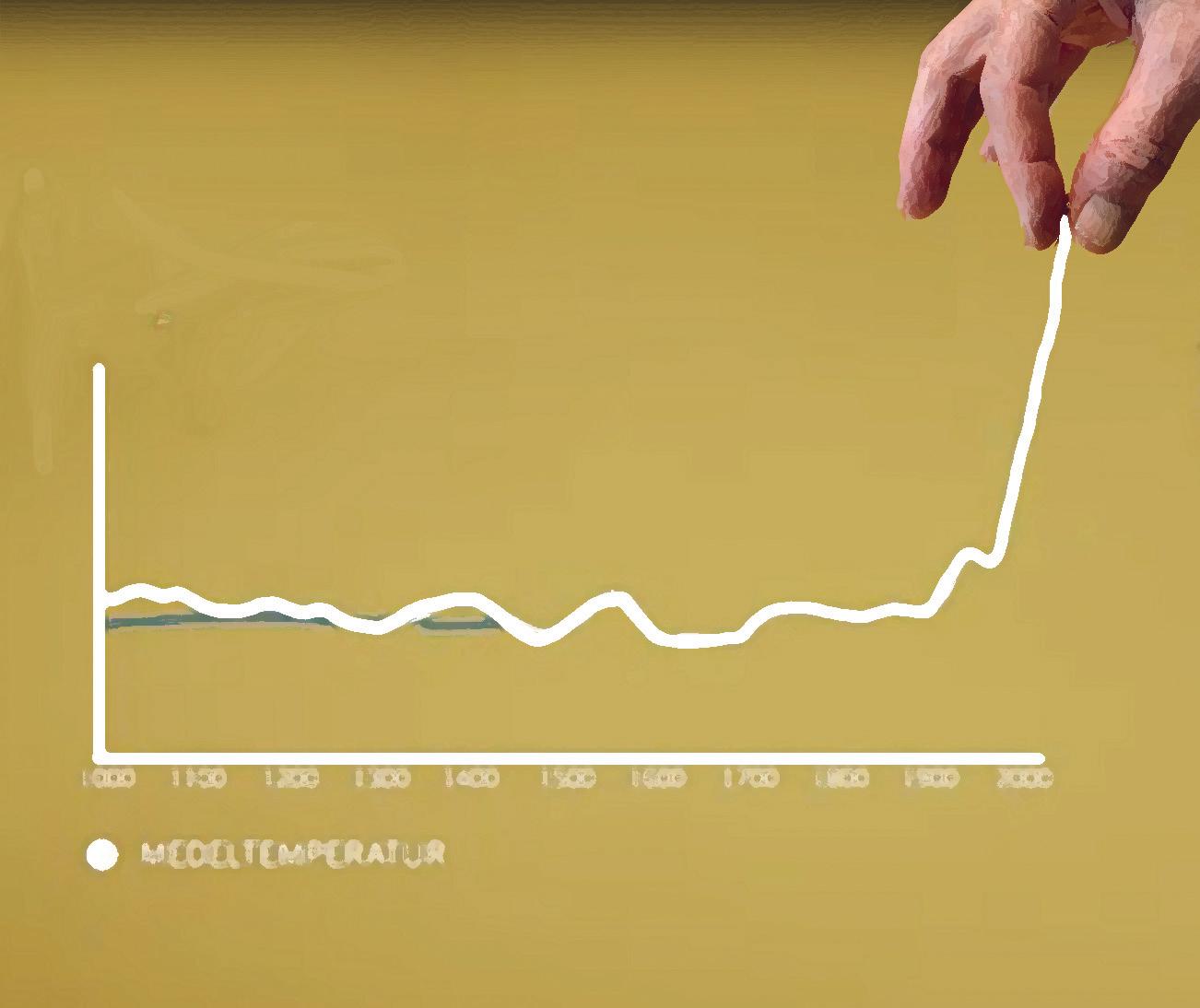
But Fredrik Jutfelt realised something was fishy the moment he read the text. Because he had been to Gotland, where
the study was conducted, together with Uppsala researcher Josefin Sundin and seen that it was neither extensive nor successful. When he and Josefin reviewed the article in detail, they found one error after another.
Together with five other researchers they reported it to Uppsala University, where they initiated an investigation, says Fredrik Jutfelt.
– And with that, I thought we had done our part, and could move on to other things. But to our surprise, the researchers were cleared from all accusations! The investigators had barely reviewed the evidence, and instead appeared to want to close the matter as soon as possible.
Fortunately, the matter was also submitted to the Central Ethical Review Board for another review. They came to
20 GUJOURNAL OCTOBER 2023
Report
About research fraud:
Since January 1, 2020, there is a law on fraudulent research regulating the responsibility of researchers and principal investigators for conducting research in accordance with good research practice. The principal investigator is obligated to report any suspicions about research misconduct to the National Board for Assessment of Research Misconduct.
Previously, the universities themselves handled any suspected fraudulent research.
Read more: https://www.science.org/ doi/10.1126/science.372.6542.560 https://www.science.org/doi/10.1126/ science.355.6331.1254
a different conclusion: The allegations were well founded and the published results were fabricated. Science withdrew the article and the Vice-Chancellor at Uppsala University determined that the researchers were guilty of fraud.
The entire matter had taken 18 months.
And that is where it could have ended.
But then Fredrik Jutfelt and his colleagues started looking into articles from
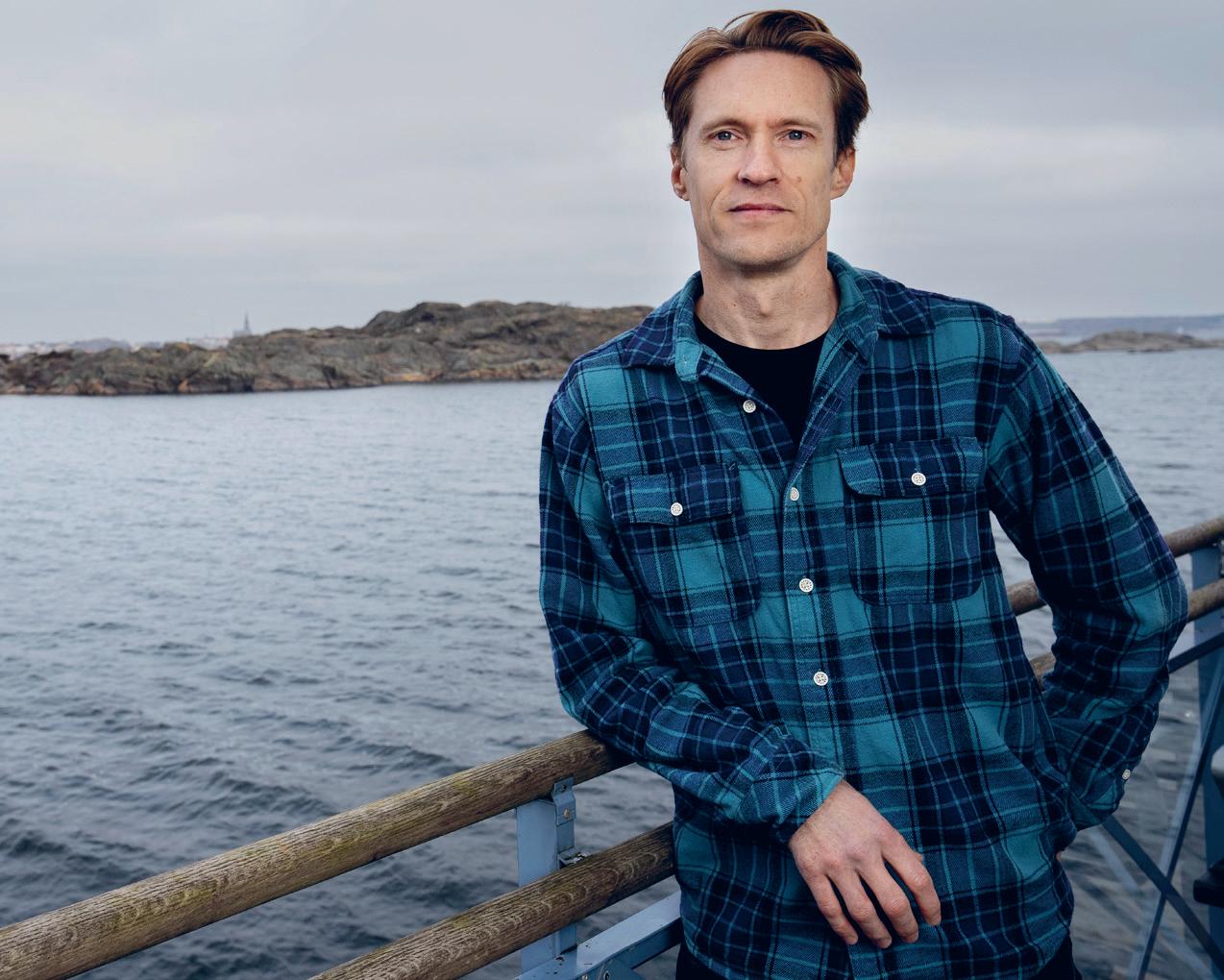
2009–2019 on how ocean acidification affects fish behaviour. From describing the effect as extremely strong in the beginning of the period, the effect seemed to have almost disappeared altogether towards the end of the period. This was more in line with the research conducted by Fredrik Jutfelt and his colleagues. When they reviewed various biological factors that could explain the change, they found nothing.
– What was troublesome was that one of the two main authors of the articles on ocean acidification, a well-qualified professor at the James Cook University in Australia, had also been the supervisor for one of the researchers who published the faulty article on perch fry. The other main author was the professor's former doctoral student, now an Associate Professor in the USA.
– When my colleagues and I requested investigations into 23 articles like these, we were accused of trying to make a career out of persecuting these researchers. An extensive investigation has now found that the researcher in USA has fabricated data in several articles. Two of the articles, one of which was published in Science, have now been retracted.
To cheat and fabricate results is something that most researchers find unthinkable, and contrary to the very idea of science.
The fact that fraud still occurs may have several causes, Fredrik Jutfelt argues.
– The pressure to publish, get credit and attract funding has increased over the past few years. In some countries, researchers also get considerably more resources if they get published in a presti-
GUJOURNAL OCTOBER 2023 21
»And with that, I thought we had done our part.«
FREDRIK JUTFELT
gious journal. At the same time, great breakthroughs are few and far between, most things we do are not that amazing. So it may be tempting to take shortcuts.
For a university management it is of course uncomfortable to have to admit fraud at their own university. In the case of the perch fry, for example, Uppsala University initially protected their researchers. And the James Cook University chose not to do an investigation into the professor accused of fraud, says Fredrik Jutfelt.

– The universities want to protect their reputation and defend their employees, particularly if the researcher is well known. For this reason they may choose to deem it negligence rather than fraud, which is of course also serious.
And journals are not all that interested in withdrawing an article either; having published a fraudulent article can risk their credibility.
Since January 1, 2020, the Swedish National Board for Assessment of Research Misconduct will assess allegations of fraud in Sweden. Previously, it was up to the individual universities to look into fraud allegations, and this is still true in many countries.
– However, an independent, efficient organisation saves both time and money in the long run. But I also believe that it is important to keep discussing how good research should be conducted. Disciplines vary in robustness; in ecology, for example, it is difficult to repeat an experi-
ment in the same way as in physics, as the same exact situation rarely occur in nature. But you can measure in a lab setting using the same experiment set-up and thus be able to compare your results.
Greater base funding, which would reduce stress, may also lessen the temptation to cheat, Fredrik Jutfelt argues.
– Because if people, because of research fraud or negligence, lose respect for science it is truly serious. After all, science is the only independent way for us people to understand the world.
Grey area the biggest problem
– Fraudulent research is of course very serious. But the major problem is instead the grey area between dishonesty and negligence. That is more difficult both to discover and to rectify.
These are the words of Björn Hammarfelt who does research on the organisation and communication of knowledge.
Peer review, where researchers review each other’s articles, is the system in place to ensure that no fraud, negligence or manipulation of data appear in scientific works. The system is not perfect, but it is the best we have available, explains Björn Hammarfelt, Associate Professor of Library and Information Science at the University of Borås.
– There are several problems with the peer-review system. For example, the reviewer is rarely paid for their work, which naturally takes away time from other things, such as writing their own articles, which is more advantageous. This means that there is almost time to
go through the data that substantiate the conclusions in the article, you must simply trust that the material was produced honestly. Most researchers still do it is because they consider peer review as part of the job; if you want to have your own work peer reviewed, it is reasonable to also review the work of others.
Few researchers are fraudulent. But just like in the rest of society, there are some people in the world of academia who stretch the truth somewhat, Björn Hammarfelt points out.
– It is rarely about entirely fabricated results, but rather about exaggerated or biased interpretations. Perhaps you give a more positive slant to a study than what can be justified by the material, or refrain from reporting things that contradict your conclusion. The reason could be to get an article published in Science or Nature who prefer to publish ground-breaking discoveries, and you don’t make those very often.
There are various suggestions for how to handle fraud and negligence. One is to
publish articles without peer review and instead let the readers openly review the articles and criticize the text.
– But in with such a system, there is a risk that a lot of bad research will be published, such as medical advice that is incorrect. How will that impact the public’s confidence in the research?
In physics and mathematics, it is common to publish articles before they have been peer reviewed, so-called preprints. This enables colleagues to comment on calculations and conclusions before sending the article to a journal. And within the humanities, there is an old tradition of holding seminars as a way of reviewing and discussing different matters, Björn Hammarfelt says.
– But writing scientific papers is still a vital part of science, and something that we make a point of teaching our students. Ensuring that they are of high quality and reliable is therefore a fundamental requirement. Fraud and negligence are serious matters in each individual case, but also because it undermines wider trust in the scientific community. för att det minskar tilltron till vetenskapssamhället i stort.
22 GUJOURNAL OCTOBER 2023
Report
Text: Eva Lundgren Photo: Johan Wingborg
Chatbot as a teacher assistant
In-depth seminars and customised oral exams – is there still a place for those with the pressure imposed at universities today? Yes, at the recently inaugurated Master’s Programme Digital Leadership they use a teacher’s assistant to make available both time and energy for more qualified teaching and examination.
However, the helpful assistant is not a human, but a specially programmed chatbot.

Report GUJOURNAL OCTOBER 2023 23
The new AI technology, where a chatbot can write a paper in a few seconds, will of course involve teaching challenges, says Fredrik Svahn, Associate Professor of Informatics and lecturer at the programme Digital Leadership.

– There has been a very high pace of development, so it is not strange that universities do not know how respond to it. But since this technology is now available in society it will soon become a natural part of working life. Just banning it must therefore be the wrong choice. Instead, I would argue that universities are obligated to help students to quickly learn to master the new tools in the best possible way.
To accomplish this, Fredrik Svahn has developed a chatbot that the students studying Digital Leadership are not only allowed, but obliged, to use on his course.
– The bot is designed to use course memos, textbooks and my own transcribed lectures. Using this “teaching assistant” the students are able to ask questions about different terms or applications. For example, what does “generativity” mean? An important term within digital innovation? Well, don’t ask me, ask the bot!
The assistant can also help the students summarize important parts of the syllabus or provide feedback on ideas.
– Using the transformation technology behind the chatbot, they can also compare different texts. For example, before a seminar the students can have group discussions that are recorded and transcribed. Subsequently, the AI can categorize the texts by content and make a graphic illustration of the various clusters of opinions that emerge. At the next seminar, we are then able to discuss the issues that the students were most interested in or where the opinions diverged the most. Earlier, I spent many an evening on reviewing and summarizing texts from students – I no longer need to do that, and can focus my energies on the discussion itself.
The chatbot can also assist during examinations, Fredrik Svahn explains.
– Take essays for example. Today, we go through with the students how to structure their work and what to include in a paper. Instead, we could use this material in a bot that provides both a template for the essay, answers questions and presents good examples.
The bot could also be an alternative
to the quiz that often concludes a course segment.
– Using a chatbot, we are able to design a much more formative examination that is akin to the old oral exam: The AI is simply instructed to discuss a subject with the student, where the teacher has decided how the AI will respond to different answers and what is required for a passing grade. The entire conversation is then sent to the lecturer who will grade it. As the conversations is recorded, a dissatisfied student can also appeal the decision. This enables us to conduct individual exams, while also making time for other things.
In research, the new technology can have great impact as well, Fredrik Svahn points out.
– What takes time in qualitative research is to summarize, interpret and compa-
re interviews, surveys and other material. Fortunately, this is precisely what AI does very well. The chatbot can also assist in writing text. For example, it can propose better wording or present suggestions when you get writer’s block.
Even if everything is more interesting with AI, we should not turn a blind eye to the problems that the technology may lead to, Fredrik Svahn points out.
– One problem is that we do not fully understand how these large language models work. They are based on massive networks with several billion neurons and can thus be compared to the human brain: We can scan the brain and examine its component parts, but nowhere can we find an explanation for what happens when we think. Similarly, we can determine that the language models work. The mechanisms are simple, but how it really works, we do not actually know. And that often makes it difficult to prevent them from doing the wrong thing. So it powerful technology that we need to learn to handle with care.
Fredrik Svahn argues that chatbots and other AI technology will grow in importance in society, not least in education.
– But we need to create a climate where the use of AI tools is seen as something positive and is not perceived as a form of cheating. In order for this to work, both teachers and students must agree on how and for what the technology is used. For this reason, the teachers at Digital Leadership have drafted a policy that all participants in the programme undertake to abide by. If everyone takes the rules seriously, and if any problems are discussed openly in a permissive environment the technology could become a powerful tool for development, for both teachers and students.
Text: Eva Lundgren Photo: Johan Wingborg
About the programme: The new international Master’s programme Digital Leadership at the Department of Applied IT comprises 12 courses and a degree project. The programme requires that both teachers and students use new AI technology, such as chatbots.
Education coordinator is Aleksandre Asatiani, Associate Professor of informatics.
24 GUJOURNAL OCTOBER 2023
»Using a chatbot, we are able to design a much more formative examination that is akin to the old oral exam.«
FREDRIK SVAHN


































